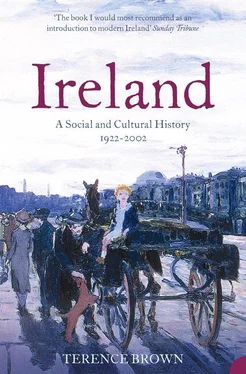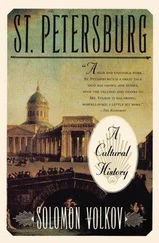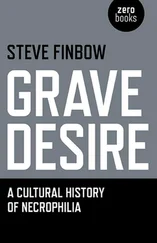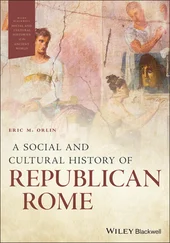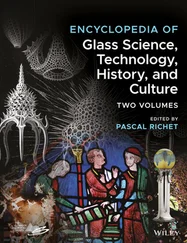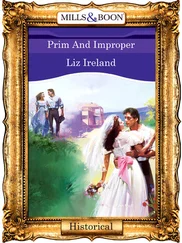By the 1920s the depressed state of cultural and social life in most of Ireland was a theme of some ancestry in the writing of social commentators. Sir William Wilde in 1853 in his Irish Popular Superstitions had lamented the decline of folk tradition in the wake of the Famine, sketching a grim picture of rural desolation:
The old forms and customs, too, are becoming obliterated; the festivals are unobserved, and the rustic festivities neglected or forgotten; the bowlings, the cakes and the prinkums (the peasants’ balls and routs), do not often take place when starvation and pestilence stalk over a country, many parts of which appear as if a destroying army had but recently passed through it. 35
Later, such writers as Sir Horace Plunkett in Ireland in the New Century (1904), W. P. Ryan in The Pope’s Green Island (1912), and Filson Young in Ireland at the Cross Roads (1903) reflected on the dismal conditions of Irish civilization. By the 1920s the attractions of the dance hall and the craze for jazz that so disturbed the bishops had done much to put the remnants of Gaelic ways into the shadows. In the 1920s George Russell, the poet, visionary, and social activist, in his journal the Irish Statesman (of which we shall hear more) frequently expressed his profound depression at the spectacle of an Irish rural world without cultural hope or energy. Writing in 1924 he declared:
Nothing in Ireland so wakens in us the sense of stagnant or defeated life as to walk at night in a country district and to find here and there little knots of young men by a gate, seated on a wall, under the shelter of a tree, sometimes silent, sometimes engaged in desultory conversation, sometimes playing cards or pitch and toss. Life is in a backwater with them. Every now and then one drops out of these groups. He has gone to America. The sense of stagnation or depression becomes a little deeper with those who remain, and then another and another breaks away, flying from the stagnant life to where they believe life has fullness. The vast majority of those who go acquit themselves well in their new surroundings. They adjust themselves rapidly to American standards and become energetic and progressive citizens. Their stagnant life in rural Ireland was not due to any lethargy, mental or physical. They had no opportunity for vital expansion. Where, in the vast majority of cases, could they meet except in the lanes? There was no village hall, no library, no gymnasium, no village choir, no place to dance except the roadside. 36
In his columns Russell and others lamented the lack of bookshops in the country and doubted “whether a single literary man in Ireland could make the income of an agricultural labourer by royalties on sales of his books among his own countrymen, however famous he may be abroad.” 37Sean O’Casey, for example, regretted the absolute gulf between Ireland’s working class and the world of high culture, enquiring rather plaintively, “And why should the docker reading Anatole France or the carter reading Yeats be a laughter-provoking conception?” 38Stephen Gwynn, the essayist, pondering whether an Irish writer had any sense of an audience, could reach no hopeful conclusion, opining sadly “men – and women – in Ireland read very little,” and, “talk is their literature.” 39
One of the places in which that literature was produced was the public house, a meeting place Russell, the tee-totaler, apparently could not bring himself to mention in his evocation of the deprivations of rural life. In his omission he neglected one of the more notable aspects of the Irish scene. In 1925 the Irish government commissioned a report on various matters relating to alcohol in the state. Their report presented a picture likely to give pause to the most libertarian. In the commission’s opinion there were 191 towns or villages where the number of public houses was excessive. Russell commented indignantly even as the commission was about its work:
It is merely absurd that a country struggling desperately to find its feet should attempt to maintain in proportion to its population, twice as many licensed houses as England and three times as many as Scotland. The statistics for individual towns are still more startling. In Charlestown and Ballaghadereen every third house is licensed to sell liquor; Ballyhaunis, with a total population of a thousand, has a drink shop for every twenty of its inhabitants, and Strokestown and Mohill run it close with one for every twenty-six. We wish Mr. Kevin O’Higgins had informed the Commission how many of these towns can boast a book-shop, a gymnasium, a public swimming-bath, or a village hall. Throughout the greater part of a rural Ireland such things are still looked on as ridiculous luxuries, and the mark of social progress is demonstrated by the opening of two public houses where one would normally suffice. 40
Russell would have found it difficult, as an ascetic idealist, to see anything but stagnation and cultural deprivation in a country where the only social expressions of large numbers of the population appeared to be talk, drink, and sociability. He saw, too, in emigration primarily social disintegration, not the painful dedication of the family to the inherited plot. He was surely right, however, in detecting in the extraordinary dependence on alcohol in the country and in the perennial emigration, sure signs of social waste, of opportunities neglected, and possibility frustrated.
In 1925 an American journalist travelled throughout Ireland and in his volume of observations managed a greater optimism about the country’s cultural future than Russell could achieve as the 1920s progressed. He wrote in hope, recognizing, however, that cultural life in Ireland depended much on isolated individuals:
At Enniscorthy it came to me very conclusively that scattered all about Ireland there is a small, highly-educated intellectual middle class which does not coincide with the moneyed people nor with the fox-hunting people at all – a class which, quietly living its own life and unobtrusively going its own way, is not often observed by the stranger. Nevertheless, it adds a very necessary leaven to the mind-life of Ireland, and it does not, as one of the ladies at the hotel said of herself “live to bloom unseen.” For those good and excellent people scattered over the face of Ireland, whose habits of mind force them to a certain solitude, may accept as a rather enheartening certainty the thought that when they sit alone playing Wagner instead of bridge or reading Joseph Conrad instead of someone’s palm, they are taking a place with honor in the community life of their country. There will be shy people at the gate to listen, and there will be those in the library to receive the book. Ireland will grow slowly into its new life…and there will be an increasing number of those who will look up eagerly toward better things. 41
Some of what follows in this book reflects on the experience of such solitary people and on their work to generate cultural and intellectual revival. Their experience did not bear out the confidence of this prophecy. The repressiveness, conservatism, and deprivation of Irish life in general, like the country’s economic poverty, did not, unhappily, admit of such inevitable amelioration.
Конец ознакомительного фрагмента.
Текст предоставлен ООО «ЛитРес».
Прочитайте эту книгу целиком, купив полную легальную версию на ЛитРес.
Безопасно оплатить книгу можно банковской картой Visa, MasterCard, Maestro, со счета мобильного телефона, с платежного терминала, в салоне МТС или Связной, через PayPal, WebMoney, Яндекс.Деньги, QIWI Кошелек, бонусными картами или другим удобным Вам способом.
